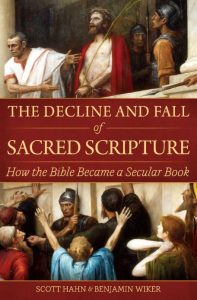By Scott Hahn and Benjamin Wiker
Scott Hahn is the founder and President of the St. Paul Center and the Fr. Michael Scanlan Professor of Biblical Theology and the New Evangelization at Franciscan University of Steubenville. He is the author or editor of over forty books on Scripture and theology.
Benjamin Wiker is a writer, teacher, lecturer, husband, and father of seven children. He is now a Professor of Political Science and Director of Human Life Studies at Franciscan University, and a Senior Fellow of Franciscan’s Veritas Center.

Martin Luther rejected the Catholic Church’s declared authority to be the interpreter of Scripture for two reasons.
First, in his eyes, the evident corruption of the Church, especially the papacy, entirely undermined the Church’s claim to be the divinely ordained, magisterial caretaker of orthodoxy through its tradition (traditio) of interpretation.
Second, Luther’s doctrine of justification by faith alone, sola fide, rendered the Church itself, as a sacerdotal institution, unnecessary: all that was needed, as other reformers urged against Luther’s desire to keep two sacraments, was for the individual to accept the saving knowledge of Christ’s sacrifice, which was readily available in the Bible.
Removing the Catholic Church’s traditio as a locus of authority guaranteed that almost the entire battle between Catholics and Protestants would therefore be fought on scriptural grounds. Since Luther claimed that the Catholic Church was an unscriptural aberration, Catholic apologists were very often led to argue the opposite, that the Church’s institutional structure and doctrines were in fact grounded in Scripture and that it was the Protestants whose views were unbiblical.
As if this Catholic-Protestant battle over the holy text were not divisive enough, Protestants fought even more fervently over biblical interpretation amongst each other. As we recall, Luther almost immediately found that his fellow Protestants, using the same founding principle of sola scriptura, came up with quite different, irreconcilable views of the Christian faith. Precisely because all the reformers agreed that the Bible alone must be the authority to settle these deep disagreements, the textual, exegetical battles were even more heated between rival Protestants.
The interesting effect among Protestants was twofold. First, the doctrine of sola scriptura collapsed in less than a century, as disagreements about what the Bible actually said caused seemingly irreparable splintering, which had political ramifications. “By the middle of the sixteenth century,” notes Michael Legaspi, “the Reformation had remade societies and governments: churches and territories across Europe lay in a patchwork of state-sponsored confessions, with the division between Lutheran and Reformed [Calvinist] often as rigid as the one between Catholic and Protestants.”
In hindsight, the divisions seem inevitable. Moreover, the attempt of each theological party to vindicate its cause in the Bible necessitated a turn to the original languages, not just Hebrew and Greek but Aramaic as well. That, however, meant a search for, and confrontation with, multiple manuscripts in the original languages that brought to light variant readings, which themselves became part of the battle over what the Bible actually says. A key result was that no one could hope to participate in this increasingly divisive conflict unless he was very well versed in the ancient languages and the science of philology. The simple believers among the priesthood of all believers were soon left far behind.
And so, within Luther’s century, the first cracks in what would later become the Great Divide were already opening between the simple believers and the academically trained biblical scholars, although at this point the latter were still believers. These scholars were, in fact, necessary to produce new translations in the vernacular, the Bible that was meant to serve as the authoritative text for believers unable to read the original languages. The predictable problem was that there were soon multiple vernacular translations in multiple languages, in significant part, following theological divisions. As Jonathan Sheehan observes, in both Germany and England, “Protestants developed the vernacular Bibles that symbolized their confessional commitments and their distinction from the authority of Rome,” but these vernacular translations had to be redone as new manuscripts were discovered, a process that seemed to call into question the solidity of the Bible.
The result was that by the early 1600s a kind of exhaustion set in. Those in charge of each distinct Protestant confession realized that it was publicly unsettling to the faith that was supposed to be grounded in the absolutely true and unalterable Word of God if the printing presses kept churning out altered translations as scholars wrestled with variant readings that arose from the availability of more original language manuscripts. Since these theological divisions were also politically very unsettling, a solution fell together during the latter part of the sixteenth and early seventeenth centuries. Put a stop to new vernacular translations so that the common people may have a stable Bible; construct explicit theological confessions that allow the adherents of each position to define, as its own traditio, how their position understands the faith and consequently how it must understand the approved version of its vernacular Bible; and finally, let the scholars continue their work without disturbing the faithful.
And so arose the initial version of the Great Divide, with the lay faithful and those who minister to them on one side, and the academic biblical scholars on the other.
You Might Also Like
In The Decline and Fall of Sacred Scripture: How the Bible Became a Secular Book, authors Scott Hahn and Benjamin Wiker trace the various malformations of Scripture scholarship that have led to a devastating loss of trust in the inspired Word of God.


